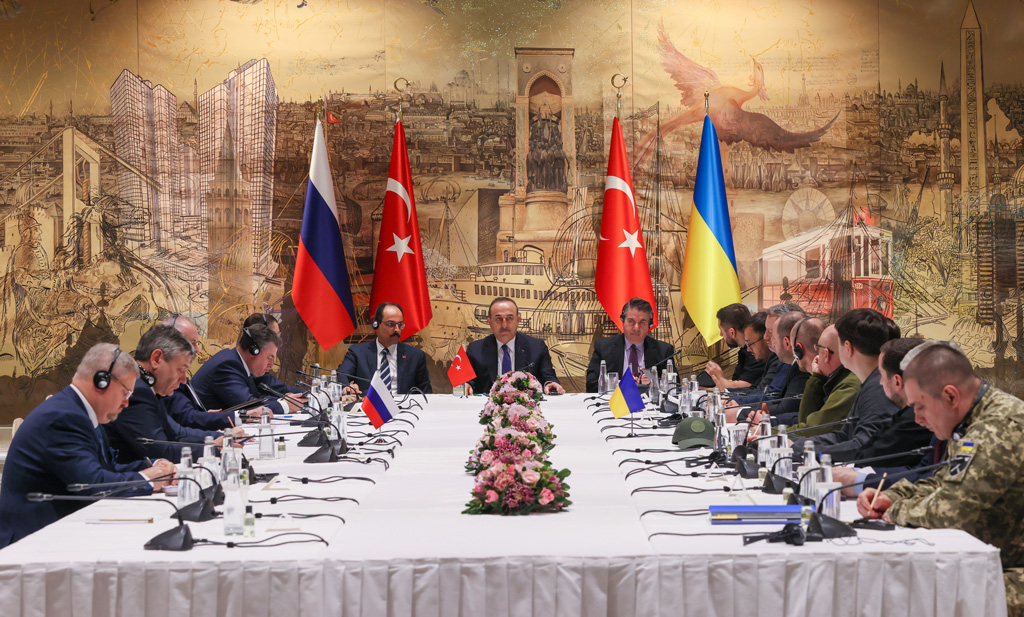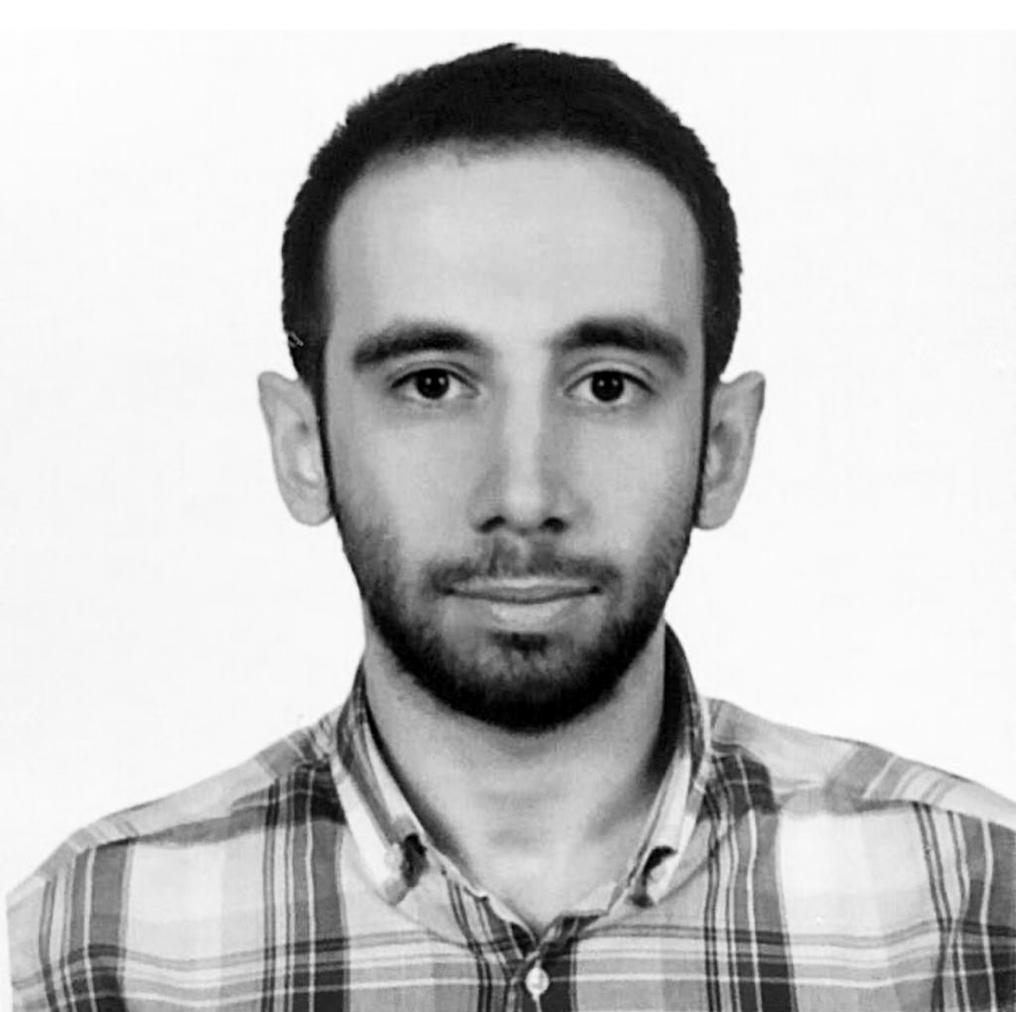
Turkiye's role in progress towards peace in Ukraine
Turkiye's regional prominence in the Black Sea region, and substantial strategic and commercial ties with Russia and Ukraine have given it an advantage in facilitating peace talks between the two countries
Share
Since the beginning of its invasion of Ukraine in late February, Russia has faced a global backlash from the international community. Many countries joined the Western sanctions while private companies stopped their operations in Russia. Despite being a member of NATO, Turkiye has followed a peculiar policy towards the conflict. While unequivocally condemning Russia’s actions and giving considerable military support to Ukraine, Turkiye did not join the attempts to punish Russia for its aggression. Instead, Turkiye actively sought ways to deescalate the conflict by keeping in dialogue with Russia, Ukraine, and its NATO allies. Despite some criticism, Turkiye's efforts significantly contributed to the advancement of peace negotiations.
Why is Turkiye in a unique position to facilitate peace?
Turkiye's regional prominence in the Black Sea region, membership in key regional and international organizations, and substantial strategic and commercial ties with Russia and Ukraine have given it an advantage in facilitating peace talks between the two countries. Turkiye is one of the major regional powers in the wider Black Sea region and has been among the founding members of BLACKSEAFOR and BSEC. Montreux Convention of 1936 gives Turkiye the right to control the Straits, the only conduit to and from the Black Sea. It also has good relations with the coastal countries of the Black Sea.
Since 2016, when Turkiye and Russia restored their broken ties after the Jet Crisis, the two countries have advanced their relations in multiple areas, including defense, energy, and cooperation, to resolve regional crises. Russia is currently building Turkiye’s first nuclear reactor, providing Turkiye with an S-400 missile defense system. The two countries cooperate on joint pipeline projects, including Turk Stream, which carries Russian natural gas to Europe. Turkiye and Russia are also involved in a number of crisis-ridden regions, including Syria, Azerbaijan, and Libya. Russia is also Turkiye's largest natural gas supplier, and 4-5 million Russian tourists visit the country each year.
Similarly, Turkiye’s relations with Ukraine have immensely developed since the annexation of Crimea in 2014. Having condemned Russia’s annexation of Crimea, Turkiye worked closely with the Ukrainian authorities on the plight of Crimean Tatars, a minority in Ukraine and the autochthon nation of the Crimean Peninsula. Turkiye’s sale of Bayraktar TB2 type drones has provided immense help to Ukraine against the separatists and the Russian forces. The two countries have also taken steps for the joint production of drones. Turkiye’s influence as a significant regional power and its good relations with both actors helped transfer the peace talks from Belarus to Turkiye.
Turkiye's diplomatic efforts
Turkiye has made a significant effort to restore peace in the region through active diplomacy from the beginning of the conflict. At the start of the invasion, Turkish President Recep Tayyip Erdogan declared that Turkiye rejects and condemns the military operation, calling it reprehensible and a clear violation of international law. Turkiye also voted for a UN General Assembly Resolution condemning Russia. President Erdogan even criticized the Western leaders for not doing enough to protect Ukraine’s territorial integrity by not taking concrete steps. These actions and statements represented Turkiye’s clear stance against Russia’s violation of Ukraine’s territorial integrity. Such a stance has been consistent with Turkiye’s policy toward Russia’s aggression toward Ukraine since the annexation of Crimea in 2014.
Turkiye has not joined the Western efforts to alienate Russia through harsh diplomatic and economic sanctions. This decision was influenced by Turkiye's strong geopolitical and economic ties with Russia. However, as President Erdogan's spokesman Ibrahim Kalin pointed out, a more crucial reason for this was to keep the lines of communication open with Russia. Indeed, Turkiye has made a genuine effort to take an active role during the crisis. President Erdogan and Foreign Minister Cavusoglu have been in contact with their Ukrainian counterparts since the beginning of the crisis. Their efforts bore their first fruit when Russian Foreign Minister Lavrov and Ukrainian Foreign Minister Kuleba met on the margins of the Antalya Diplomacy Forum on March 10. The meeting was a significant milestone as it was the first time the two foreign ministers met and listened to each other.
Turkiye's continuing positive approach and active diplomacy made possible the March 29 meeting in Istanbul. Delegations from Ukraine and Russia met in Dolmabahce Palace and worked towards a final peace between the two nations. President Erdogan was personally present at the latest event in Istanbul and hosted the meeting, and his speech to the delegations from both countries received a standing ovation. In Istanbul, Russia agreed to reduce its military activity in Chernihiv and Kyiv while Ukraine offered neutrality in exchange for security guarantees.
The March 29 meeting in Istanbul could be a watershed moment in the Russia-Ukraine peace process. Turkiye demonstrated its importance as a major regional player in the Black Sea region throughout the crisis and its credibility in the eyes of Ukraine and Russia helped the progress of peace negotiations between the two nations. Turkiye's status in NATO as a partner that fulfills its alliance responsibilities and contributes significantly to the resolution of global crises was also strengthened as a result of this process.
[AA, March 31, 2022]
Tags »
Related Articles






